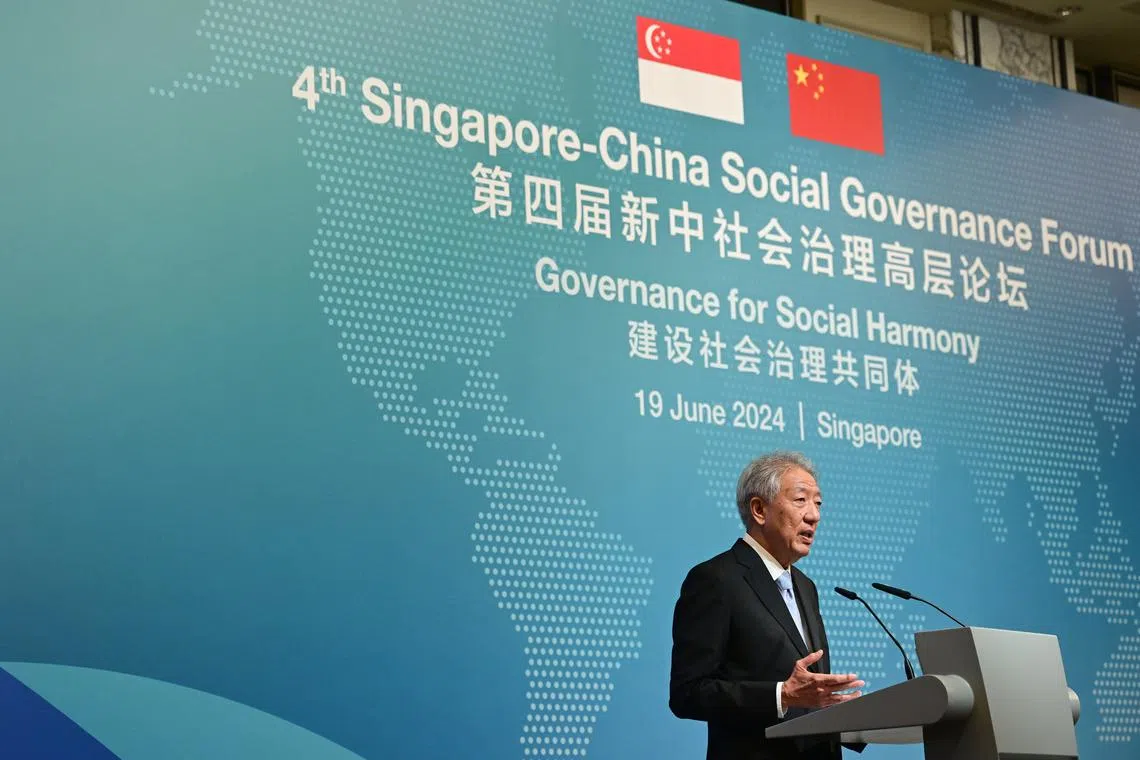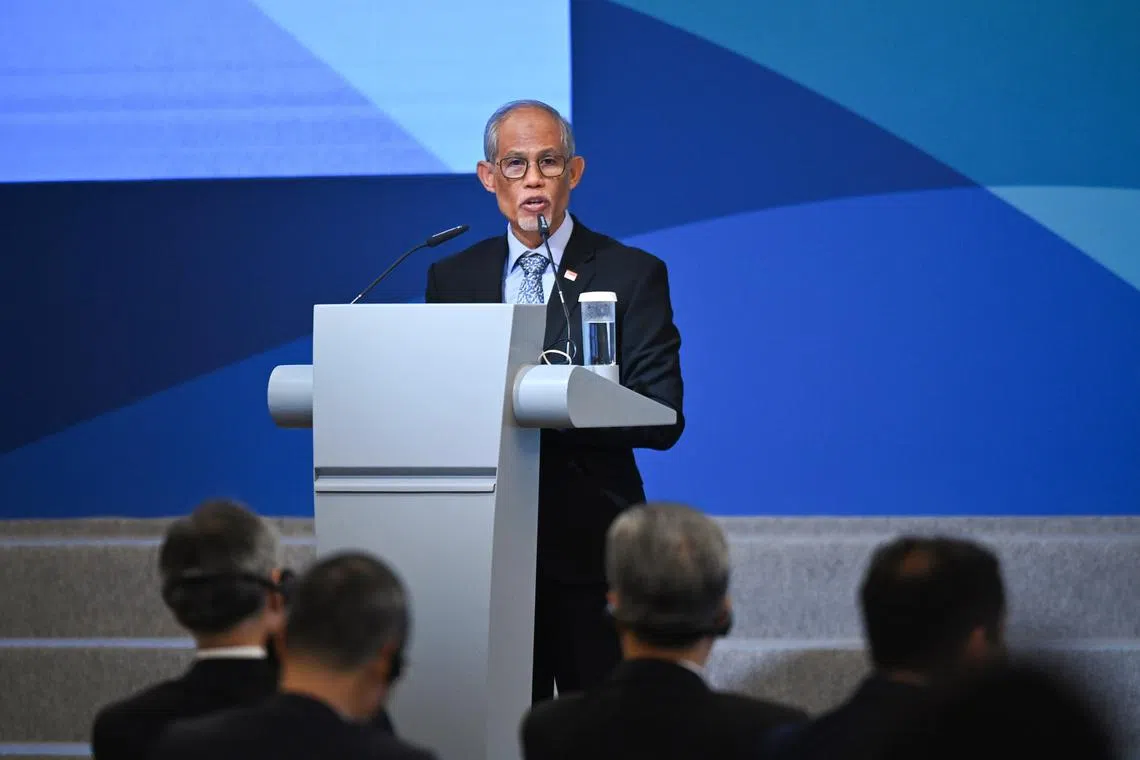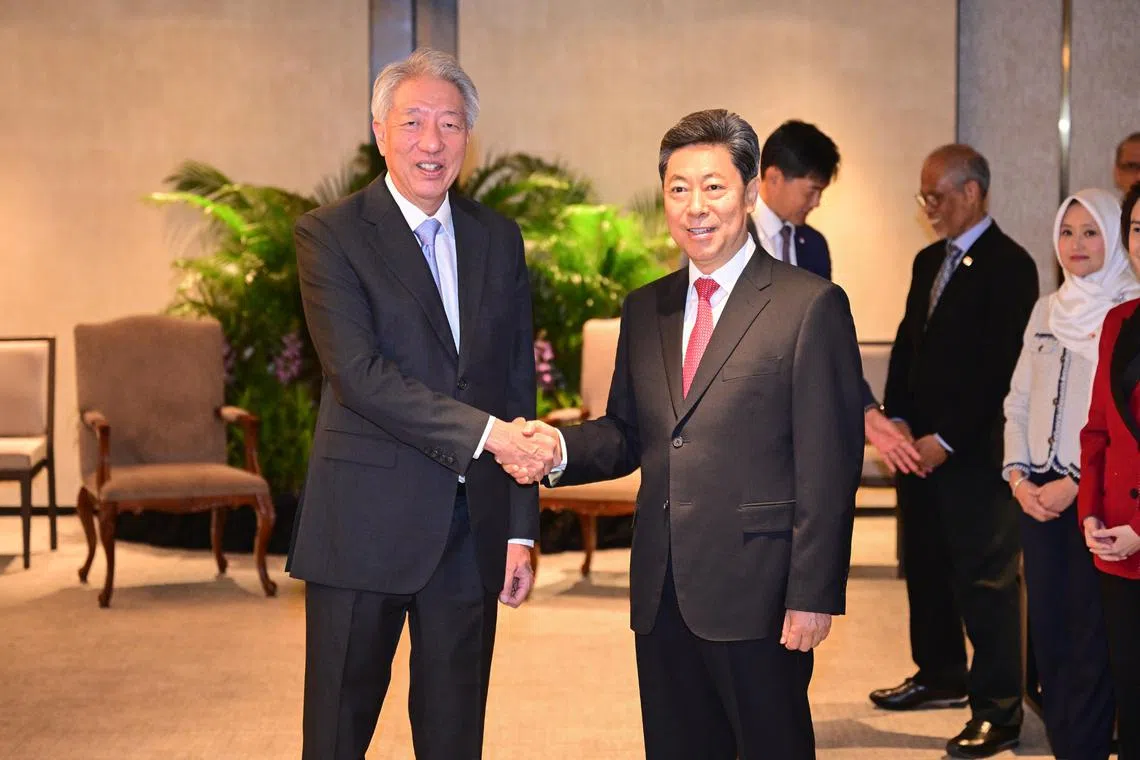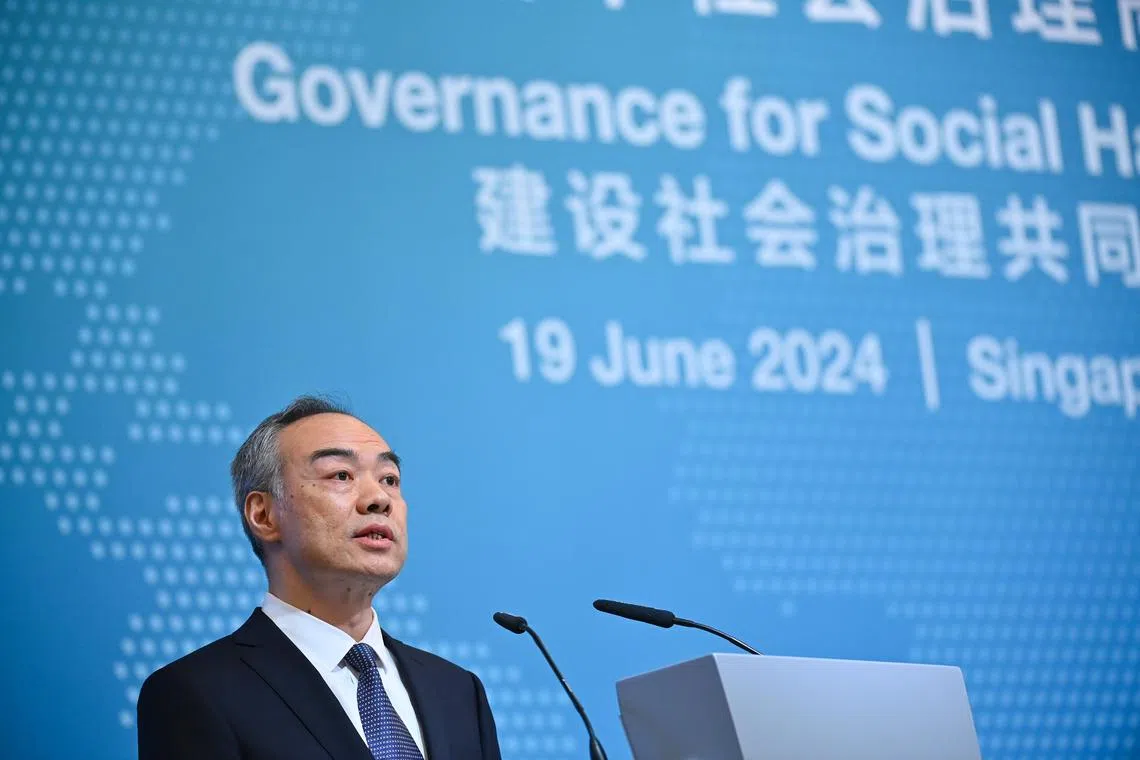Every citizen given a stake in Singapore’s success: SM Teo Chee Hean
Sign up now: Get ST's newsletters delivered to your inbox

Senior Minister and Coordinating Minister for National Security Teo Chee Hean said all Singaporeans, regardless of their racial or religious affiliation, have an equal stake in Singapore.
ST PHOTO: AZMI ATHNI
SINGAPORE – The three ingredients to give every Singaporean a stake in the country’s success are multiculturalism, tripartism and home ownership, said Senior Minister and Coordinating Minister for National Security Teo Chee Hean on June 19.
This is Singapore’s guiding philosophy for social governance, he said at the fourth Singapore-China Social Governance Forum.
In his speech, titled Opportunities For All, Where Everyone has a Stake – Singapore’s Approach to Social Harmony, SM Teo said all Singaporeans, regardless of their racial or religious affiliation, have an equal stake in Singapore.
“This principle of equal treatment shaped our system of governance very fundamentally,” he said.
Singapore also fosters a sense of ownership in its labour relations through a unique tripartite partnership between workers, employers and the Government, he added.
The Government supports tripartism in various ways, including funding companies and workers for skills upgrading and investments that improve productivity, he said. Singapore also has institutions that help workers and unions resolve differences with employers.
“In this way, tripartism ensures that a worker’s work is rewarded, and everyone has a share in the fruits of progress,” SM Teo added.
A sense of ownership is also fostered by housing and the local communities in which Singaporeans live, he said. Singapore has approximately 90 per cent of home ownership among its people, one of the highest in the world. Home ownership motivates Singaporeans to work hard and invest in building a better Singapore, SM Teo said.
“Home ownership has helped forge a sense of rootedness in Singapore. This is critical for a country comprising immigrants from different races and religions with no common history,” he said, adding that Singapore’s neighbourhoods are a place to form collective memories and a shared identity.
The last edition of the high-level forum took place in 2016. In March 2024, both countries agreed to restart the forum as part of efforts to restore people-to-people exchanges to pre-pandemic levels.
The 2024 one-day forum was co-chaired by SM Teo and Mr Chen Wenqing, a member of the political bureau and secretary of the Political and Legal Affairs Commission of the Communist Party of China’s (CPC) central committee.
Themed Governance for Social Harmony, it was held by the Ministry of Social and Family Development at the Shangri-La Hotel and provided a platform for about 90 Singapore and Chinese officials to share their experiences in social governance.
Building on SM Teo’s address, Social and Family Development Minister Masagos Zulkifli emphasised the importance of a refreshed social compact, where everyone plays a part in building a resilient and caring society. This is built on family-centricity, where strong families are the foundation of a strong society, and ensuring that social mobility is sustained, so families are able to thrive and progress.

Social and Family Development Minister Masagos Zulkifli emphasised the importance of a refreshed social compact, where everyone plays a part in building a resilient and caring society.
ST PHOTO: AZMI ATHNI
“As society evolves, new sets of challenges will inevitably arise, whether it be social issues or demographic challenges like an ageing population,” he said. “The Forward SG exercise
Speaking in Mandarin, Mr Chen quoted then Chinese Vice-President Xi Jinping – who visited Singapore in 2010 – as saying that “during his lifetime, Mr Deng Xiaoping repeatedly suggested that China should learn from Singapore. Such learning was, is and will continue to be necessary”.
“Inclusiveness is a distinctive feature of the Chinese civilisation,” said Mr Chen. “It has much in common with Singapore’s diversified culture featuring harmonious coexistence.”

Senior Minister and Coordinating Minister for National Security Teo Chee Hean (left) and Mr Chen Wenqing, member of the political bureau of the Communist Party of China central committee, at Shangri-La Hotel on June 19.
ST PHOTO: AZMI ATHNI
He added that Singapore has provided valuable inspiration to China to tackle difficulties during China’s reform and opening up. At the same time, China’s development has brought tremendous opportunities to Singapore.
“China and Singapore have broad space for cooperation in such areas as strengthening the security of law enforcement, cracking down on telecoms fraud and money laundering in accordance with the law, and enhancing exchanges between our police departments,” Mr Chen said.
Mr Yin Bai, secretary-general of the Political and Legal Affairs Commission of the CPC central committee, said China and Singapore have become two of the safest countries in the world. However, the world is undergoing tremendous change, and countries are faced with more issues in social security, he noted.

Mr Yin Bai, secretary-general of the Political and Legal Affairs Commission of the CPC central committee, said China and Singapore have become two of the safest countries in the world.
ST PHOTO: AZMI ATHNI
During the panel discussions, Minister of State for Communications and Information Rahayu Mahzam and vice-president of China’s Supreme People’s Court He Xiaorong discussed the various practices which both countries have adopted to resolve differences across communities.
Senior Minister of State for Culture, Community and Youth Low Yen Ling and Vice-Minister Wang Zhizhong of China’s Ministry of Public Security discussed how community engagement can promote social cohesion within and across communities.
Visits to various cultural and community spaces were also organised for the 40 Chinese delegates.
These included a visit on June 18 to the National Museum of Singapore and Asian Civilisations Museum, where they learnt more about the events leading up to Singapore’s independence in 1965. These included the racial riots and Singapore’s policies to manage racial differences and ensure social harmony.
The visits also showcased Singapore’s historical role as a cosmopolitan trading hub at the centre of Asia, as well as the cultural diversity within Asia which has influenced its multicultural identity and global outlook.
On June 19, Mr Masagos hosted a visit to Our Tampines Hub to show Singapore’s social governance policies at play, with communal spaces designed to enhance social cohesion and community building, and various modes of citizen engagement.
The inaugural Singapore-China Social Governance Forum in 2012 was held in Singapore with the theme Social Management Challenges in Urban Development. The second forum, in 2014, themed Social Governance and the Rule of Law, took place in Beijing, while the third in 2016 was held in Singapore with the theme Governance in a Diverse Society.
The latest edition of the forum comes after former prime minister Lee Hsien Loong and Chinese President Xi Jinping agreed at a meeting in Beijing in 2023 to upgrade bilateral relations to an “all-round high-quality future-oriented partnership”.
Mr Chen also called on Prime Minister and Minister for Finance Lawrence Wong at the Istana on June 19.
Writing on his social media platforms
“Most people are aware of our economic links. But we also cooperate in other areas including in law enforcement, as well as the legal and judicial fields,” he said.
“Our two countries differ in size and other characteristics, but there are also important similarities,” he added. “That’s why we both find it useful to share our experiences and ideas for social harmony and cohesion, and to learn from each other.”


